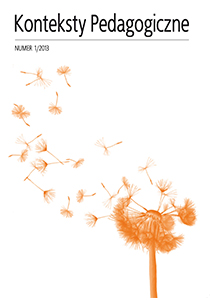Abstract
The following article discusses important questions of the individual needs of a child with autism. The authors have identified three fundamental planes which are among the most significant areas of reference in the work with a child for parents and specialists whose aim is to support a child’s development and to enhance his or her functioning in society. Communication, social inter-actions and education are, according to the authors, the basic areas and scopes defining the most important goals of the didactic, educational and therapeutic work. The text systematizes main assumptions behind actions oriented to treating a child with autism.
References
Alternatywne i wspomagające metody komunikacji, red. J.J. Błeszyński, Kraków 2006.
Bigas U., Autyzm – charakterystyka zachowań językowych w autystycznym spektrum zabu-rzeń,[w:] Logopedia. Teoria zaburzeń mowy, S. Grabias, M. Kurkowski, Lublin 2012.
Bluestone J., Materia autyzmu. Łączenie wątków w spójną teorię, przeł. M. Dąbrowska--Jędral, A. Klimek, Warszawa 2012.
Bragdon A.D., Gamon D., Kiedy mózg pracuje inaczej. ADHD – alkoholizm – autyzm – déjà vu – dysleksja – leworęczność – słuch absolutny – pamięć fotograficzna – sezonowe zaburzenie afektywne – synestezja, przeł. L. Okupniak, Gdańsk 2003.
Encyklopedia językoznawstwa ogólnego, red. K. Polański, Wrocław 2003.
Frith U., Autyzm. Wyjaśnienie tajemnicy, przeł. M. Hernik, G. Krajewski, Gdańsk 2008.Grabias S., Teoria zaburzeń mowy. Perspektywy badań, typologie zaburzeń, procedury postępowania logopedycznego, [w:] Logopedia. Teoria zaburzeń mowy, red. S. Grabias, M. Kurkowski, Lublin 2012.
Kapuściński R., Spotkanie z innym jako wyzwanie XXI wieku. Wykład wygłoszony 1 paź-dziernika 2004 roku z okazji przyznania tytułu doktora honoris causa Uniwersytetu Jagiellońskiego, Kraków 2004.
Lewandowska M., Mój sposób postępowania z dzieckiem autystycznym,[w:] Logopedia. Teoria i praktyka, red. M. Młynarska, T. Smereka, Wrocław 2005.
Maciarz A., Biadasiewicz M., Dziecko autystyczne z zespołem Aspergera, Kraków 2000.
Markiewicz K., Możliwości komunikacyjne dzieci autystycznych, Lublin 2004.
Młynarska M., Smereka T., Psychostymulacyjna metoda kształtowania i rozwoju mowy i myślenia (nowa nazwa: Metoda „Dyna-Lingua M.S.”, [w:] Logopedia. Teoria i prak-tyka, red. M. Młynarska, T. Smereka, Wrocław 2005.
Psychologia języka dziecka. Osiągnięcia, nowe perspektywy, red. B. Bokus, G. Shugar, Gdańsk 2007.
Randall P., Parker J., Autyzm. Jak pomóc rodzinie,przeł. S. Pikiel, Gdańsk 2002.
Smaler R., Techniki psychostymulacyjne w terapii dziecka z niesamoistnym opóźnionym rozwojem mowy na tle autyzmu. Studium przypadku, [w:] Logopedia. Teoria i prakty-ka, red. M. Młynarska, T. Smereka,Wrocław 2005.
Smith D.D., Pedagogika specjalna,Warszawa 2008.
Suchowierska M., Nauczanie dzieci z autyzmem zachowań werbalnych – dwa uzupełnia-jące się podejścia,Kraków 2010.
Suchowierska M., Ostaszewski P., Bąbel P., Terapia behawioralna dzieci z autyzmem, Gdańsk 2012.
Watkins A., Assessment In Inclusive Setting: Key Issues for Policy and Practice,Odense, Denmark: European Agency for Development In Special Needs Education 2007.
Winczura B., Dziecko z autyzmem. Terapia deficytów poznawczych a teoria umysłu,Kra-ków 2008.
Wing L., Związek między zespołem Aspergera i autyzmem Kannera, [w:] Autyzm i zespół Aspergera, red. U. Frith, przeł. B. Godlewska, Warszawa 2005.Wing L., Gould J., Severe impairments of social interaction and associated abnormalities in children: epidemiology and classification, „Journal of Autism and Developmental Disorders” 1979, vol. 9 (1).
Zabłocki K.J., Autyzm, Płock 2002.
In accordance with the recommendation of the Ministry of Science and Higher Education, which aims to counteract the practice of “ghostwriting” and “guest authorship,” all authors submitting their text for publication should attach an author’s statement which declares the contribution of each of the authors to the article. The printed and signed statement should be delivered by mail or other means to editor-in-chief Joanna Skibska or sent in the form of a scan to the following e-mail address: redakcja@kontekstypedagogczne.pl. The authors will not receive remuneration for publishing their papers. The editors reserve the right to make minor editorial changes to the articles which will not affect the substance of the article. We encourage all authors to prepare their articles in accordance with the guidelines for manuscript preparation. Download pdf file.
Authors transfer all copyrights and grant the journal the right of first publication with the work simultaneously licensed under a Creative Commons Attribution License that allows others to share the work with acknowledgement of the work's authorship and initial publication in this journal. All authors agree to the publishing of their email addresses, affiliations and short bio statements with their articles during the submission process.

